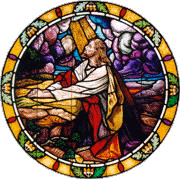What We Catholics Believe!
|
|
|
|
We believe in one
God the Father, the Almighty, Creator of heaven and earth, of all that
is seen and unseen.
|
"Hear, O Israel, the Lord our God is one Lord..." (Deut 6:4; Mk 12:29). "The supreme being must be unique, without equal...If God is not one, he is not God." (Tertullian, Adv Marc 1,3,5: PL 2, 274). Catechism of the Catholic Church: 228 |
|
We believe in one
Lord, Jesus Christ, the only Son of God, eternally begotten of the Father,
God from God, Light from Light, true God from true God, begotten, not
made, one in Being with the Father. Through Him all things were made.
|
The name Jesus means "God Save;" the title "Christ" means "Anointed One;" the title "Son of God" signifies the unique and eternal relationship of Jesus Christ to God his father; the title "Lord" indicates divine sovereignty. Catechism of the Catholic Church: 452-455 |
|
For us men and for
our salvation He came down from heaven: by the power of the Holy Spirit
he was born of the Virgin Mary, and became man.
|
Jesus Christ possesses two natures, one divine and the other human, not confused, but united in the one person of God's Son. The Incarnation is therefore the mystery of the wonderful union of the divine and human natures in the one person of the Word. Catechism of the Catholic Church: 481, 483 |
|
For our sake He
was crucified under Pontius Pilate; He suffered, died, and was buried.
|
"Christ died for our sins in accordance with the scriptures" (1 Cor 15:3); By his loving obedience to the Father, "unto death, even death on a cross" (Phil 2:8), Jesus fulfills the atoning mission (Isa 53:10) of the suffering Servant, who will "make many righteous; and he shall bear their iniquities" (Isa 53:11; Rom 5:19) Catechism of the Catholic Church: 619, 623 |
|
On the third day
He rose again in fulfillment of the Scriptures.
|
Jesus did really die and through his death for us conquered death and the devil "who has the power of death" (Heb 2:14); Christ, "the first-born from the dead" (Col 1:18), is the principle of our own resurrection, even now by the justification of our souls (ROM 6:4), and one day by the new life he will impart to our bodies (ROM 8:11). Catechism of the Catholic Church: 636, 658 |
|
He ascended into
heaven and is seated at the right hand of the Father.
|
Jesus Christ, the head of the Church, precedes us into the Father's glorious kingdom so that we, the members of his Body, may live in the hope of one day being with him for ever. Having entered the sanctuary of heaven once and for all, He intercedes constantly for us as the mediator who assures us of the permanent outpouring of the Holy Spirit. Catechism of the Catholic Church: 666-667 |
|
He will come again
in glory to judge the living and the dead and His kingdom shall have
no end.
|
When He comes at the end of time to judge the living and the dead, the glorious Christ will reveal the secret disposition of hearts and will render to each man according to his works and according to his acceptance or refusal of grace. Catechism of the Catholic Church: 682 |
|
We believe in the
Holy Spirit, the Lord, the Giver of life, who proceeds from the Father
and the Son. With the Father and the Son he is worshipped and glorified.
He has spoken through the Prophets.
|
The Holy Spirit, whom Christ the head pours out on his members, builds, animates, and sanctifies the Church. She is the sacrament of the Holy Trinity's communion with men. Catechism of the Catholic Church: 747 |
|
We believe in one
holy catholic and apostolic Church.
|
This is the sole Church of Christ, which in the Creed we profess to be "one, holy, catholic, and apostolic". These four characteristics, inseparably linked with each other, indicate essential features of the Church and her mission. It is Christ who, through the Holy Spirit, make His Church one, holy, catholic, and apostolic, and it is He who calls her to realize each of these qualities. Catechism of the Catholic Church: 811 |
|
We acknowledge one
baptism for the forgiveness of sins.
|
By Christ's will, the Church possesses the power to forgive the sins of the baptized and exercises it through bishops and priests normally in the sacrament of Penance. "...for the risen Christ entrusted to the apostles the power to forgive sins when he gave them the Holy Spirit. Catechism of the Catholic Church: 984, 986 |
|
We look for the
resurrection of the dead,
|
By death the soul is separated from the body, but in the resurrection God will give incorruptible life to our body, transformed by reunion with our soul. Just as Christ is risen and lives for ever, so all of us will rise at the last day. Catechism of the Catholic Church: 1016 |
|
...and life everlasting.
|
At the end of time, the Kingdom of God will come in its fullness. Then the just will reign with Christ for ever, glorified in body and soul, and the material universe itself will be transformed. God will then be "all in all'' (1 Cor 15:28), in eternal life. Catechism of the Catholic Church: 1060 |
|
Amen
|
In Hebrew, amen comes from the same root as the word "believe." This root expresses solidarity, trustworthiness, faithfulness. And so we can understand why "Amen" may express both God's faithfulness towards us and our trust in Him. Catechism of the Catholic Church: 1062 |
